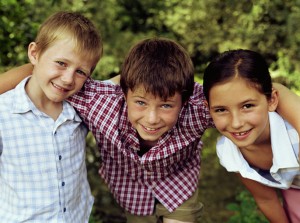
PDD-NOS was a form of autism spectrum disorder diagnosed prior to the new DSMV being released ? How was it diagnosed and how can parents help their child with this diagnosis?
PDD-NOS stands for “pervasive developmental disorder – not otherwise specified”. “Pervasive” means it effects all areas of a person’s life and “developmental” means it begins in early childhood. It is considered part of the “autism spectrum”, alongside autsim and Asperger’s syndrome. “Spectrum” means it can include a wide range of characteristics, abilities and challenges. All people on the “autism spectrum” have difficulties with social interaction, communication and restricted or repetitive interests or activities. “Not otherwise specified” means that people with this diagnosis do not meet the diagnostic criteria for either autsim or Asperger’s though they share some traits of these.
A diagnosis of PDD- NOS usually results from a child being assessed for autism or Asperger’s and having significant social difficulties but not showing enough characteristics to fit these diagnosis. As all people show some behaviours associated with the autism spectrum, people need to be having a significant level of social difficulty in their daily lives to get a diagnosis. The diagnosis is usually carried out by a suitably qualified and experienced paediatrican, speech pathologist and/or psychologist.
Difficulties with social impairment can vary from being withdrawn and avoiding social contact through to people who try to interact with others but appear odd or inappropriate at times.
They may:
- have difficulty understanding the thoughts and feelings of others
- lack sympathy or empathy
- have difficulty understanding how to behave in social situations
- not understand the unwritten rules of social interaction
- have difficulty with the social aspects of play with other chidlren
- have difficulty using and understanding eye contact and facial expressions
- have difficulty joining in with others and sharing toys and games
- may prefer to play alone and may like to do things their own way
- have difficulty taking into account the needs and interests of others.
Difficulties with communication can vary from people who have communication delays and disorders through to people who can speak very well but may have difficulty with the social aspects of communicating.
They may:
- have difficulty taking turns in a conversation
- dominate the interaction or get stuck on a favourite topic
- be very literal and not understand more abstract meanings
- ask excessive questions
- repeat things that they have heard somewhere else such as on TV or in a movie.
- not understand that certain topics are not appropriate in certain places or with certain people
- may appear blunt or inappropriate
- have difficulty with the nonverbal aspects of communicating such as facial expressions and tone of voice use a flat or unusual tone or even sound as though they have an accent
Restricted and repetitive interests and activities can vary widely depending on the person. These behaviours may be present but less obvious than occurs in people with autsim or Asperger’s or they may not be present to any significant level. Some other behaviours such as sensory issues or repetative movements may also be prersent but again to a lesser degree than in autism and Asperger’s syndrome.
People with PDD-NOS may:
- have a strong focus they have on one, or a limited range of activities
- focus on a topic such as dinosaurs, transport timetables or ancient Egypt
- focus on a certain movie, TV show or character
- show an intense level of interest and spend long periods of time doing their activity have little interest in other activities not related to their topic of choice
- spend most of their free time doing, talking about or thinking about their interest.
- show unusual or repetitive movements such as: flapping, rocking, toe walking, finger movements
- show repetitive movements with objects such as spinning, lining up, sorting, flicking
- show sensory issues such as sensitivity to noises, smells, textures, certain clothes or foods.
All people on the autism spectrum have their own personality, and vary according to their intelligence level, family and cultural background.Some may have other diagnosis such as ADHD, intellectual disability or learning problems while others do not. Each person with autism requires support and understanding tailored to their own unique needs.
Common questions:
What kind of support services can my child access? Children in with a diagnosis of PDD-NOS are eligible for the federal government’s “Helping Children with Autism” package. This provides therapy and resources for chidlren under 7 years of age and medicare rebates for therapy services for children under 15. In South Australia children with a diagnosis of PDD-NOS are not currently supported by Autism SA and are not currently considered funded students at school (unless they meet another funding category such as communication difficulties).
What kind of help does my child need? Support needs vary from child to child so each child should be individually assessed to determine what is most important for them. Many children benefit from speech pathology for communication skills, occupational therapy for fine motor and sensory issues and psychology for behaviour. All these professionals also help children to develop social skillls.
How can I find out more? Our website has information about the process of assessment for autism spectrum disorders and the Helping Children with Autism package.
Related Blog Posts
If you liked this post you may also like:
Speaking of books!
Superpowers at home
Holiday fun!
Using PLAY DOUGH To Grow



